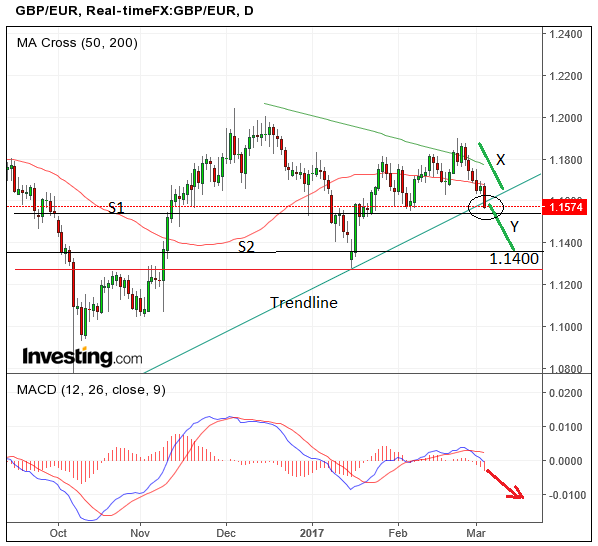5-Day Forecast: GBP/EUR Exchange Rate Weakness Seen on Trend-Line Break

Pound Sterling is trading slightly higher against most its rivals at the start of the new week in what appears to be something of a corrective move higher if we consider the poor start to the month of March suffered by the UK currency.
On the inter-bank market at the time of writing, 1 GBP = 1.1586 EUR
Those with international payments will see their banks offering a rate in the region of 1.1250-1.13 while international payment providers are likely to be quoting a more competitive spread at 1.14800.
Concerning the outlook, we are facing a potentially soft week.
The GBP/EUR exchange rate lost a substantial amount of ground last week and its likely to continue after breaking below a key trendline on the daily chart (circled):

Whilst the break is still tentative - and only took place on Friday and has not yet been confirmed - it biases the technical outlook to a bearish setting.
The move below the 50-day moving average (red line) is another bearish signal, and the fact the exchange rate is below the 200-day too, is a further bearish signal.
The MACD has just dipped quite sharply and generally has the look and feel of a momentum indicator on the way down.
A break below Friday’s 1.1770 lows would probably signal a continuation down to the next level of support at 1.1721 from the S1 monthly pivot – which is a line calculated using the open, high, low and close of the month and is used by traders often to trade against the trend.
S1 is likely to be an obstacle to progress lower although it should eventually be overcome and a move below 1.1695 would confirm that and see an extension down to the next target at 1.1400.
When a trendline is broken there is a handy way of predicting how much lower the exchange rate is likely to fall, using technical analysis theory, which states that the move following the piercing a trendline (Y on the chart below) is likely to be the same length as the move prior to the trendline (X).
Data to Watch Between March 06 - 10
On Tuesday, March 7 there is the release of tier two data for the Pound in the form of the Retail Sales Monitor from the British Retail Consortium (BRC).
It is a survey rather than a hard data release but sentiment indicators are still often quite reliable indicators of future activity.
The monitor, out at 00.01 (GMT) is expected to show a 0.2% rise in February from the -0.6% decline in Jan.
Overall, recent UK data has been described as soft, and this combined with the resurfacing of fresh Brexit risks relating to calls for a Scottish referendum are have been weighing on Sterling.
Currently, the market is of the opinion that the related uncertainty caused by Scotland is negative for Sterling so more losses may be on the horizon as the narrative unfolds. There is talk that the Scottish Nationalists may call for a referendum as the UK triggers Article 50.
News that the Chancellor may be increasing taxes in his Budget on Wednesday, March 8, may weigh on the Pound if the measures are seen as inhibiting growth and consumption.
Fiscal tightening would stand in contrast to the policies being implemented in the US by Donald Trump's administration, for example, who are expected to cut taxes and spend more on infrastructure.
“Sterling fell hard this week as data took a turn for the worse. After a month of very narrow trading ranges, sterling finally broke down on the heels of softer data. Aside from slower service-sector activity, manufacturing activity also eased in February and between the stronger U.S. dollar, Scotland pushing for another referendum vote and Brexit's Article 50 later this month, it was only a matter of time before the bottom underneath Sterling fell out. Now that support has been broken, we anticipate further losses in GBP,” says Managing Director of BK Asset Management, Kathy Lien in a recent note seen by Pound Sterling Live.
Budget is Key Political Event
UK politics are this week dominated by the UK budget on Wednesday when the Chancellor lays out his spending and taxation plans as the country heads for Brexit negotiations.
What could be quite Pound-poisitive would be an opening of the purse-strings and an intent to increase spending and cut taxes.
This is of course highly unlikely as Chancellor Hammond is a fiscal conservative and while some give-aways will be announced they will be modest.
The surprise would be a notable expansion in spending in anticipation of an economic slowdown relating to Brexit.
However, the economy's resillience suggests the Chancellor would rather head into the unknown with a 'war chest' of savings should activity take a dip in coming years.
Agenda for the Euro
The main event for the Euro is the European Central Bank (ECB) rate meeting on Thursday, March 9 at 13.30.
It is expected to result in no-change in policy for whilst inflation has risen, prompting some to question whether the ECB is keeping monetary policy too loose, and although unemployment has fallen substantially, the ECB are unlikely to take any risks until after the French presidential election.
In addition, the high inflation has mainly been as a result of rising gasoline prices due to the rising price of oil. Core inflation has not been going up as aggressively.
The ECB meeting will include updated economic forecasts and a press meeting with Mario Draghi.
On the hard data front, there are some tier two releases in the coming week, in the form of German Factory Orders which are expected to decline by -2.7% more in January.
Then on Friday, there is the German Trade Balance which is forecast to moderate from 18.5bn to 18.1bn before.
Another key focus will be poll results for the French presidential election.
Recent polls have shown centrist Macron overtaking Le Pen and it this trend continues it could remove some of the pressure holding back the Euro.
"While populist parties have tapped into widespread voter disenchantment with politics and the European Union across Western Europe, we do not think they will be able to translate that into winning government and implementing their policies," says Tom Taylor, Head of International Economics at NAB in Sydney.
Financial markets seem to agree with that assessment – while the Euro has depreciated and bond rates have moved up in France and Italy, the changes are nothing like what a Euro-zone break-up would be expected to produce.
"Opinion polls show strong populist party support in some countries but it does not seem enough to get them over the line in France or the Netherlands. Italy is more of a worry but EU exit faces constitutional hurdles there and the populist vote in Germany is much lower," says Taylor.
Save
